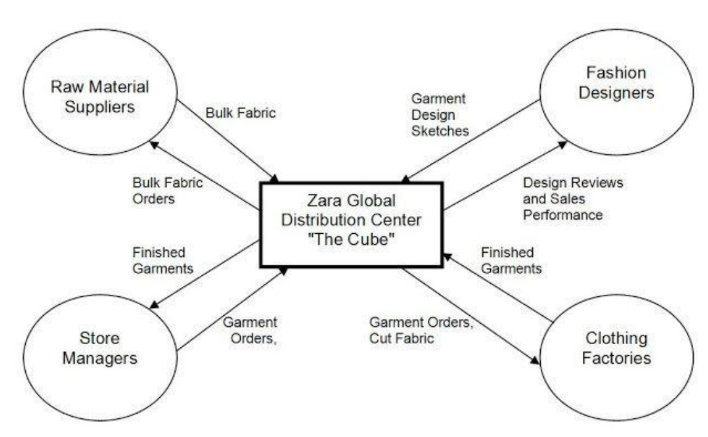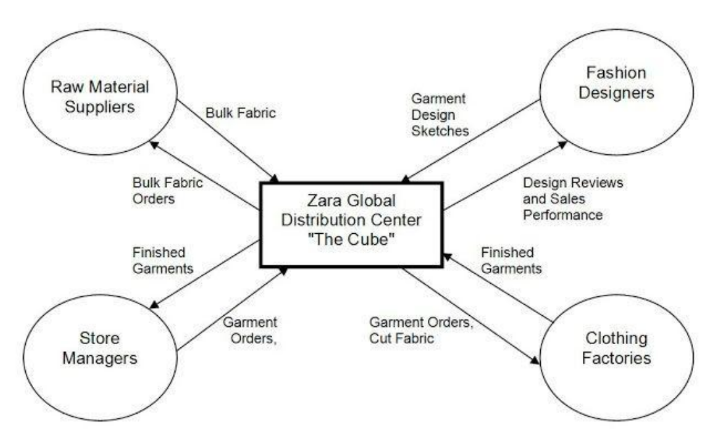
Specify and procure FF&E and OS&E at scale with Fohlio today. Empower teams to move faster and improve their operational workflow with specification, prototyping, procurement, collaboration, and analytics tools.
Given that Zara is one of the pioneers of fast fashion, it's no surprise that the Spanish brand also leads the way in revolutionizing lead time management. By implementing a unique approach to supply chain management, Zara was able to significantly reduce lead times and respond rapidly to changing fashion trends.
Read: Bridging the Design-Implementation Gap: Best Practices for Large-Scale Fit Out Projects
Zara changes its clothing designs every two weeks, while its competitors average every two to three months. This is one of the reasons the label tripled its profits and stores, and is now the third biggest retailer in the world.
Vertical Integration
Zara has vertically integrated its supply chain, which controls every aspect of the production process, from design to distribution.
By having its own factories and production facilities, Zara has minimized dependencies on external suppliers and gained greater control over lead times.

Image reference: ZARA'S CASE STUDY -the Strategy of the Fast Fashion Pioneer
Just-in-Time Manufacturing
Zara employs a just-in-time manufacturing strategy, producing smaller quantities of garments and replenishing stock frequently based on real-time sales data.
Zara focuses on optimizing production processes to achieve shorter lead times. They employ modular manufacturing techniques, where garments are broken down into components that can be easily assembled later. This modular approach facilitates faster production, reduces lead times, and enables quick adaptations to design changes. In turn, doing this minimizes excess inventory and allows Zara to respond to changing customer preferences with shorter lead times.
Quick Response and Information Sharing
Zara places a strong emphasis on communication and collaboration within its organization and leverages technology and analytics.
Store managers and sales associates regularly provide feedback on customer preferences, which is quickly relayed to designers and production teams. This fast and *ahem* seamless information sharing enables Zara to make timely adjustments and allows them to anticipate demand, identify successful designs, and optimize production and distribution processes accordingly, ultimately reducing lead times.
Read: Nailing Multi-Location Retail Store Openings: 3 Essential Considerations
Agile Supply Chain
Zara's supply chain is designed for flexibility and speed. They maintain close relationships with a network of local suppliers, allowing them to source fabrics and other raw materials quickly. By keeping production closer to the market, Zara minimizes transportation time and reduces lead times associated with long-distance sourcing.
Zara maintains a culture of continuous improvement, constantly seeking ways to enhance efficiency and reduce lead times. They regularly analyze their processes, solicit feedback from employees and customers, and implement innovative solutions to streamline operations and further reduce lead times.
Read more: The Psychology of Retail Store Interior Design, Part 1: Color
Zara's focus on reducing lead times has proven to be a key driver of its success.
Their ability to swiftly respond to fashion trends and deliver new products to stores in weeks has earned them a competitive advantage in the fast-paced fashion industry. By implementing a vertically integrated supply chain, adopting quick-response manufacturing practices, and emphasizing efficient logistics, Zara has demonstrated how reducing lead times can lead to increased customer satisfaction, improved sales, and sustainable business growth.
In summary, Zara's success in reducing lead times stems from its vertical integration, fast fashion model, just-in-time manufacturing, agile supply chain, efficient production processes, data-driven decision-making, and a culture of continuous improvement. These strategies have enabled Zara to respond swiftly to fashion trends, minimize lead times, and stay ahead of the competition in the fast-paced fashion industry.
Specify and procure FF&E and OS&E at scale with Fohlio today. Empower teams to move faster and improve their operational workflow with specification, prototyping, procurement, collaboration, and analytics tools.
References:
- https://www.researchgate.net/publication/362568585_ZARA'S_CASE_STUDY_-the_Strategy_of_the_Fast_Fashion_Pioneer_The_Strategy_of_the_Fast_Fashion_Pioneer
Expore Fohlio
Learn how to:
- Save days of work with faster specification
- Create firm-wide design standards
- Automate and centralize procurement
- Keep your whole team on the same Page
- Manage product data
- Track budget against cost in real time.
- Prepare for asset valuation
Published Jul 18, 2023

